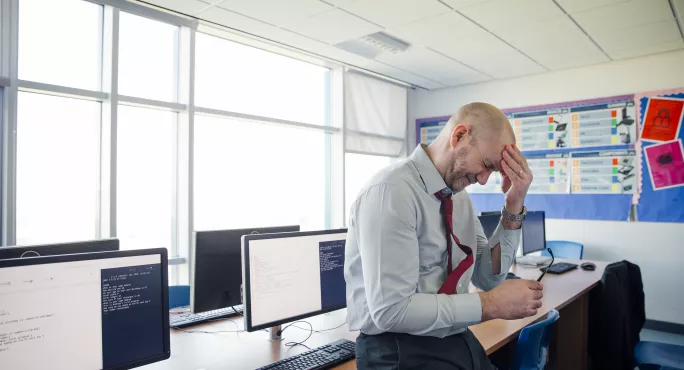Teachers ‘popping pills’ to cope with workload

Teachers have been forced to “pop pills” to cope with increasing workload, a teachers’ union has been told today.
NASUWT teaching union member Owain Morgan-Lee told the union’s annual conference in Birmingham that many colleagues had been signed off as “long-term sick because they’re popping pills to try to cheer themselves up because the job is dragging them down to a point where their health is in a serious, serious condition”.
Mr Morgan-Lee was speaking during a debate on workload at the conference this morning.
Teachers voted to campaign for educators to have limits set on their working hours, as well as for the union to campaign to promote teachers’ rights to a work-life balance.
- NASUWT: Nearly 3/4 of female teachers experience misogyny in schools
- Retention: Nearly half of state school teachers ‘plan to quit within five years’
- NASUWT: Pandemic pay freeze showed ‘barely concealed contempt for teachers’
Mr Morgan-Lee said the increase in workload stress is “grinding down our morale, grinding down the good teachers of the UK”.
He added that, at a recent wellbeing session at his school, he had considered whether he could “do some finger-painting up in the art department for a few hours” or “I might decide to knit and natter in the textiles department. I decided to do a mindfulness session.
“Lying on the sweaty, cold, hall floor, thinking about what noise my knees were making, how my toes felt and what that grape tasted like and how it felt in my mouth,” he said.
“I wondered how many more seconds or minutes I’d have to do that for, before the stress, the anxiety, the fear of going back into the classroom and logging onto my school emails, how many more minutes I’d have to do that for before it all ebbed away and I reached nirvana.”
He said that none of this would “chip away” at the workload he faced.
Another member Damien McNulty said there is now a culture of teachers being expected to respond to messages outside of working hours.
He said school leaders’ responses to emails going unanswered out of working hours were to “set up WhatsApp groups, which will ding and ping all evening when you’re trying to get some rest and relaxation”.
NASUWT will now work to “expose the inadequacy of current teachers’ conditions” across the country, as a result of the vote today.
In a NASUWT survey of over 4,000 members across the UK carried out earlier this month, more than six in 10 (62 per cent) said that their workload had “increased significantly” over the past 12 months, while nine in 10 (91 per cent) said their workload had increased.
Responses from nearly 3,000 members also found that full-time teachers said they were working 57 hours per week on average, with 15 of these worked outside the normal school day.
Most respondents out of 4,000 (84 per cent) reported that, over the past 12 months, their job had adversely affected their mental health.
Of those who said their mental health had been impacted, over half, (52 per cent), said that workload was the most important factor in this.
Nearly half of respondents (48 per cent) said they spent more time or much more time on classroom teaching, supervision or preparation over the past year, while over a third (37 per cent) had spent more time on remote learning.
Nearly six in 10 (59 per cent) said they had spent more time on data and assessment requirements over the past year, and 70 per cent said they had spent more time on administrative work.
They also reported spending more time on lesson planning, dealing with parents and pastoral care over the past year.
Dr Patrick Roach, general secretary of NASUWT, said that successive governments had “failed” to reduce teachers’ workload or enforce contractual limits on working hours.
He added that teachers and school leaders had been “serving on the front line” throughout the pandemic, and had been “placed under immense pressure, which is no longer sustainable”.
“No teacher should expect to be subject to levels of workload pressure that will make them ill or force them out of a job they love,” he said.
He said that excessive workload was not only bad for teachers but damaging to pupils’ education.
“Teachers deserve a better deal, which must include a contractual entitlement to a limit on their workload and working hours,” he added.
You need a Tes subscription to read this article
Subscribe now to read this article and get other subscriber-only content:
- Unlimited access to all Tes magazine content
- Exclusive subscriber-only stories
- Award-winning email newsletters
Already a subscriber? Log in
You need a subscription to read this article
Subscribe now to read this article and get other subscriber-only content, including:
- Unlimited access to all Tes magazine content
- Exclusive subscriber-only stories
- Award-winning email newsletters
topics in this article



